|
Rose Vetter
nee: Zentner
Richmond, BC
Major Contributor, Writer, Translator, Editor, & Mentor
The Collected Works of
Rose Zentner Vetter
|
"I embarked upon our journey of hope to begin a new life."
My ancestral roots are in Alsace Lorraine and the Black Forest in Germany. My father was born in Palanka in the Batschka. My mother’s ancestors came from Futok, although she was the only child in her family who was born in Endze/Zarev Brod, Bulgaria, while they had resettled there for a number of years before returning to the Batschka.
Neusatz 1935
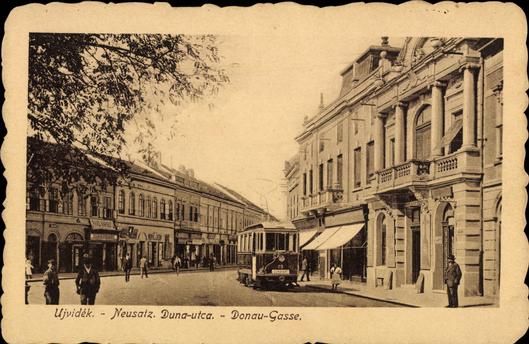
I was born in the once beautiful city of Neusatz/Novi Sad, Yugoslavia.. We lived very close to the Danube, directly across the historic Peterwardein Fortress, where Prince Eugene of Savoy had defeated the Ottoman army. Living in peaceful co-existence in a multi-ethnic population, I grew up being trilingual, learning to speak Serbian and Hungarian besides my German mother tongue. However, my happy childhood came to an abrupt end amid the increasing tensions of World War II and the entry of German troops into our city. Hungary, one of the Axis powers, reclaimed the Batschka as one of its territories. . Overnight the bureaucracy and official language changed to Hungarian and Novi Sad once again became Újvidék.
Although I was a child at the time, some events have become indelibly etched in my memory. I will never forget waking up to the sound of wailing sirens at night, running to an air raid shelter, hearing bombs whistling through the air and landing with a tremor, and finally returning to find our building in ruins, In September 1944 my father was among the last able-bodied men to be conscripted into the German military. In October, with the approach of the Russian front and the retreat of the German army, my mother, sister and I boarded the refugee train with two hastily packed suitcases. |
 |
At one point the train was stopped and all passengers ran for cover into a sparsely canopied forest, while we were targeted by machine gun fire from Allied dive bombers. We arrived in war-ravaged Germany, where we spent over two years being shuffled back and forth in Eastern Germany between a number of farms and squalid, overcrowded refugee camps, surviving starvation and diseases. After the end of the war we found ourselves in the Russian-Occupied Zone, however, in 1946 we were fortunate to be transferred to the state of Lower Saxony in the British Zone, where life became more bearable. |
Letter from Camp Pasicevo/Altker
by Eva Zentner
This letter was sent to my family in Germany 2½ years after our flight
from Neusatz, Batschka. It was written by my aunt Eva Zentner of Batschka Palanka from the forced labour camp in Pasicevo/Altker. Most of her letters were censored so badly by the Communists that they arrived as sheds of paper, making it virtually impossible to make sense of them. This letter was the only one my parents kept. It bears the stamp of the Õsterreichische Zensurstelle S.Z.(Austrian Censorship Office S.Z.) Eva Zentner (Pilger) managed to escape to Austria in the summer of 1947 and eventually emigrated to Trenton, NJ.
| In 1950 my family emigrated to Canada and settled in the prairie city of Winnipeg. |
| |
Rose, shortly after arriving in Canada. |
Every summer, my father's pride and joy were his pepper plants, to the point that my mother complained he was neglecting the other vegetables and flowers when it came to watering them He fertilized them faithfully and he virtually flooded them with water. He always maintained that "Paprika ist eine Sumpfpflanze (try to twist your tongue around that last word), meaning, "The pepper plant is a marsh plant". No wonder they thrived so beautifully in the Danube plain.
He grew the most
|
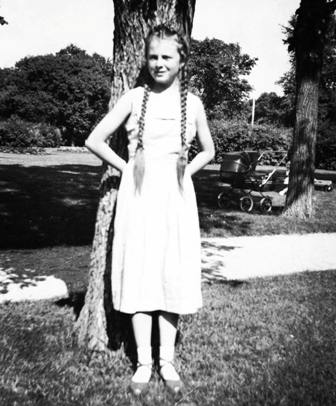 |
beautiful peppers in Winnipeg, Manitoba, planting them on the Victoria Day
weekend (American Memorial Day) and protecting them from potential frost with shingles all around. For those of you in Alberta, Saskatchewan, Ontario and the harsh climate states of the US, you can do it too, because the summers are very hot day and night, unlike in the Pacific Northwest.
|
 |
Rose's journey to Canada!
A New Beginning in Winnipeg
"At the time we came to
Winnipeg in 1950,
virtually all of the old-timers of St. Joseph's Parish
spoke with a Schwäbish dialect." [read
more]
|
| |
|
After having had my schooling disrupted for about two years due to the war and constantly moving from one camp to another, I was fortunate to be able to complete my education, putting all my efforts into mastering the English language. I started working
as a mailroom clerk for a large furniture chain, working my way up to collection officer, also acting as the unofficial interpreter for numerous new immigrant customers from Germany. |
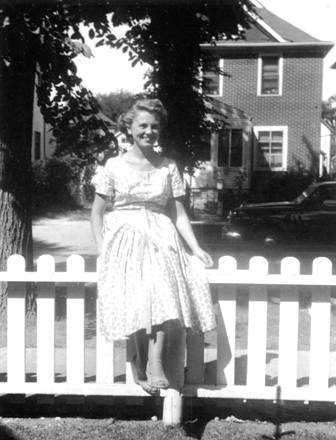 |
I met and married my husband Günther Vetter in Winnipeg, where our three children were born.
Christmas 1959 with my parents in Winnipeg.
Günther, Linda & I on the left.
My sister Christine & her two children right.
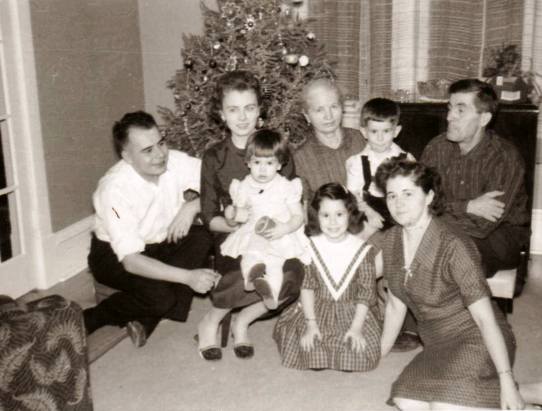
In 1968 we moved the family to the West coast city of Vancouver, BC.
Us in 1987

Günther & Rose at daughter Carolyn's wedding . . .
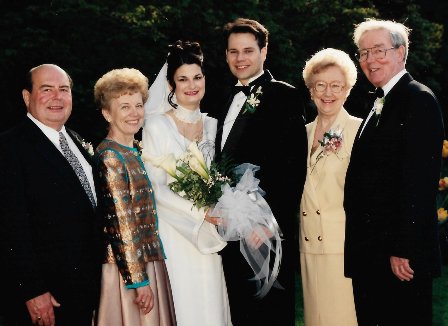
Son Richard & wife Terezinha with
Günther & Rose.
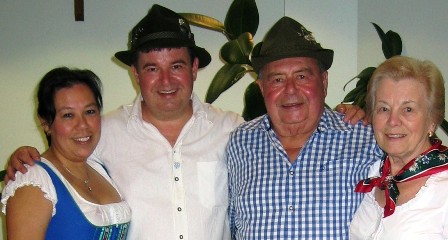
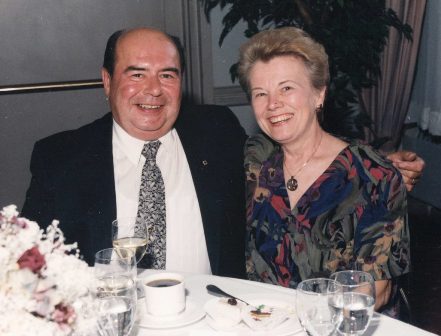
Rose with daughter Linda's family . . .
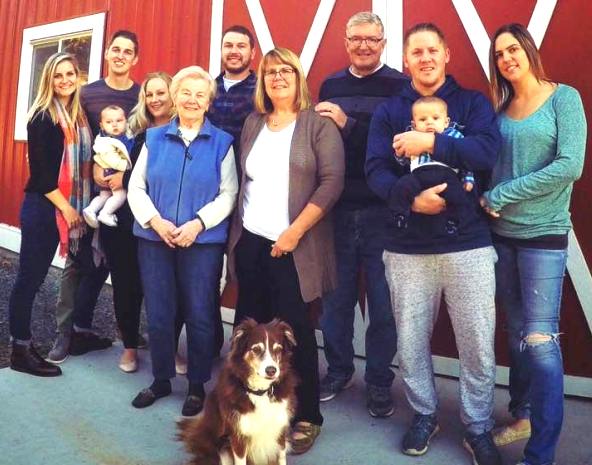
Us in Alaska

The picture was done by an artist, showing both winter (left) and summer views of our cabin.
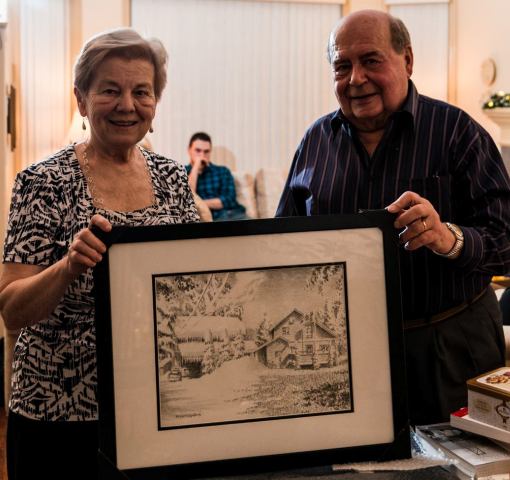
[Günther Vetter May 2, 1935 – April 22, 2015]
We were blessed with eight grandchildren and four great grandchildren.
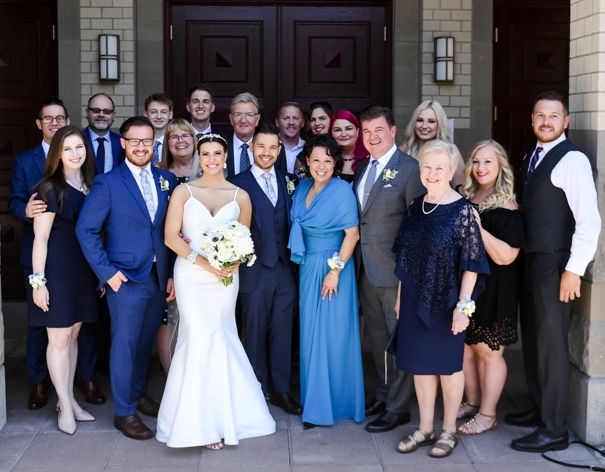
When I first connected to the Internet, one of the first words I Googled was “Donauschwaben”. I discovered the DVHH - truly Helping Hands, which helped me discover cousins in the USA, Brazil and Europe.
Märzluft Brothers' Letters
Remembering My Great Uncles by Rose Vetter
Letter exchanges between brothers, Georg & Valentin Märzluft, my great uncles.
Georg Märzluft of Temerin, Batschka
Two beautiful sisters. celebrating Christine’s birthday with family in Kelowna, June 30, 2019.

In closing, I want to extend to all of you the greeting of our ancestors:
Grüß Gott!
Rose Vetter
DVHH Editorial & Translator: 2007-Present
Winnipeg, Manitoba, CAN Destination Archivist: 2008-Present
Cooking Donauschwaben Style! Editor: 2014-Present
Danube Swabians in Bulgaria Coordinator: 2013-Present
Lookups Guide for numerous Batschka Village Books
DVHH Board of Directors 2011-2014
DVHH Corporate Secretary 2012-2014
The Collected Works of Rose Zentner Vetter
Major Contributor, Writer, Translator, Editor, & Mentor
|
  |